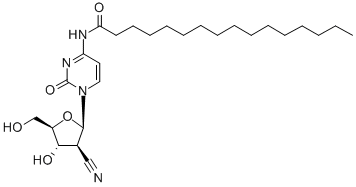Uses
Sapacitabine, it is an orally available nucleoside analog prodrug of CNDAC that acts through a dual mechanism. It has potential use in chemotherapy.
Definition
ChEBI: Sapacitabine is a nucleoside analogue resulting from the formal condensation of the carboxy group of hexadecanoic acid with the amino group of CNDAC. It is the prodrug of CNDAC and is currently in clinical development for the treatment of acute myeloid leukemia (AML). It has a role as an antimetabolite, an antineoplastic agent, a prodrug and a DNA synthesis inhibitor. It is a nucleoside analogue, a nitrile and a secondary carboxamide. It is functionally related to a hexadecanoic acid and a CNDAC.
Biochem/physiol Actions
Sapacitabine is an orally active prodrug of nucleoside analog CNDAC that exhibits potent anti-tumor activity in both blood and solid tumors. CNDAC incorporates into DNA where it causes single-strand breaks (SSBs), which are converted into double strand breaks (DSBs) during S phase.

